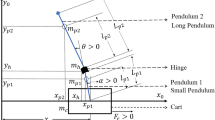Abstract
This article presents a multiobjective approach to the design of the controller for the swing-up and handstand control of a general cart-double-pendulum system (CDPS). The designed controller, which is based on the human-simulated intelligent control (HSIC) method, builds up different control modes to monitor and control the CDPS during four kinetic phases consisting of an initial oscillation phase, a swing-up phase, a posture adjustment phase, and a balance control phase. For the approach, the original method of inequalities-based (MoI) multiobjective genetic algorithm (MMGA) is extended and applied to the case study which uses a set of performance indices that includes the cart displacement over the rail boundary, the number of swings, the settling time, the overshoot of the total energy, and the control effort. The simulation results show good responses of the CDPS with the controllers obtained by the proposed approach.
Similar content being viewed by others
References
M. Yamakita, M. Iwashiro, Y. Sugahara, K. Furuta. Robust Swing up Control of Double Pendulum. In Proceedings of the American Control Conference, IEEE Press, USA, pp. 290–295, 1995.
W. Zhong, H. Rock. Energy and Passivity Based Control of the Double Inverted Pendulum on a Cart. In Proceedings of IEEE Conference on Control Applications, IEEE Press, Mexico City, Mexico, pp. 896–901, 2001.
Y. Dan, Z. Li, Z. Tan. Down-down to Down-up Control of a Circular-rail Double Inverted Pendulum with Human Simulated Intelligent Control. In Proceedings of the SPIE — The International Society for Optical Engineering, vol. 6794, pp. 67940K(1–6), 2008.
M. Romzi, J. Nishino, T. Odaka, H. Ogura. Refining Fuzzy Control Rules for the Inverted Double Pendulum System Based on a Transformation-type Genetic Algorithm. Systems and Computers in Japan, vol. 29, no. 14, pp. 50–57, 1999.
S. K. Oh, W. Pedrycz, S. B. Rho, T. C. Ahn. Parameter Estimation of Fuzzy Controller and Its Application to Inverted Pendulum. Engineering Applications of Artificial Intelligence, vol. 17, no. 1, pp. 37–60, 2004.
B. J. Zhao, S. Y. Li. Ant Colony Optimization Algorithm and Its Application to Neuro-Fuzzy Controller Design. Journal of Systems Engineering and Electronics, vol. 18, no. 3, pp. 603–610, 2007.
X. Q. Zuo, Y. S. Fan. A Chaos Search Immune Algorithm with Its Application to Neuro-fuzzy Controller Design. Chaos, Solitons and Fractals, vol. 30, no. 1, pp. 94–109, 2006.
Y. S. Wang, K. J. Wang, J. S. Qu, Y. R. Yang. Adaptive Inverse Control Based on Particle Swarm Optimization Algorithm. In Proceedings of the IEEE International Conference on Mechatronics & Automation, IEEE Press, Niagara Falls, Canada, vol. 4, pp. 2169–2172, 2005.
H. R. Pourshaghaghi, M. R. Jahed-Motlagh, A. Montazerl, J. Poshtan, A. A. Jalali. Optimized Multiobjective H ∞ Control Applied to Inverted Pendulum. In Proceedings of the 33rd Annual Conference of the IEEE Industrial Electronics Society, IEEE Press, Taipei, Taiwan, pp. 938–943, 2007.
Z. S. Li, Y. Q. Tu. Human Simulated Intelligence Control, National Defense Industry Press, China, 2003. (in Chinese)
V. Zakian. Control Systems Design: A New Framework, Springer-Verlag, London, UK, 2005.
Y. W. Leung, Y. Wang. An Orthogonal Genetic Algorithm with Quantization for Global Numerical Optimization. IEEE Transactions on Evolutionary Computation, vol. 5, no. 1, pp. 41–53, 2001.
J. T. Tsai, T. K. Liu, J. H. Chou. Hybrid Taguchi Genetic Algorithm for Global Numerical Optimization. IEEE Transactions on Evolutionary Computation, vol. 8, no. 4, pp. 365–377, 2004.
T. Y. Chou, T. K. Liu, C. N. Lee, C. R. Jeng. Method of Inequality-based Multiobjective Genetic Algorithm for Domestic Daily Aircraft Routing. IEEE Transactions on Systems, Man, and Cybernetic — Part A, vol. 38, no. 2, pp. 299–308, 2008.
S. C. Chiam, K. C. Tan, A. Al Mamum. Evolutionary Multiobjective Portfolio Optimization in Practical Context. International Journal of Automation and Computing, vol. 5, no. 1, pp. 67–80, 2008.
D. C. Montgomery. Design and Analysis of Experiments, Wiley, New York, USA, 1991.
J. E. Baker. Reducing Bias and Inefficiency in the Selection Algorithm. In Proceedings of the 2nd International Conference on Genetic Algorithms on Genetic Algorithms and Their Application, L. Erlbaum Associates Inc., Hillsdale, New Jersey, USA, pp. 14–21, 1987.
Author information
Authors and Affiliations
Corresponding author
Additional information
This work was supported by the National Science Council, Taiwan (No. 96-2221-E-327-027, No. 96-2221-E-327-005-MY2, and No. 96-2628-E-327-004-MY3).
Tung-Kuan Liu received the B. Sc. degree in mechanical engineering from the National Akita University, Akita, Japan, in 1992, and the M. Sc. and Ph.D. degrees in mechanical engineering and information science from the National Tohoku University, Sendai, Japan, in 1994 and 1997, respectively. From 1997 to 1999, he was a senior manager with the Institute of Information Industry, Taiwan, China.
From 1999 to 2002, he was an assistant professor with the Department of Marketing and Distribution Management, National Kaohsiung First University of Science and Technology, Kaohsiung, Taiwan. He is currently an associate professor with the Department of Mechanical and Automation Engineering, National Kaohsiung First University of Science and Technology.
His research interests include artificial intelligence, applications of multiobjective optimization genetic algorithms, and integrated manufacturing and business systems.
Chiu-Hung Chen received the B. Sc. degree in computer engineering from the National Chiao Tung University, Taiwan, China, in 1990 and the M. Sc. degree in computer science and information engineering from the National Taiwan University, Taiwan, China, in 1992. He is currently a Ph.D. candidate at the National Kaohsiung First University of Science and Technology, Taiwan, China.
His research interests include evolutionary computation, multiobjective optimization, intelligent manufacturing, and multimedia system.
Zu-Shu Li received the B. Sc. degree in physics from Sichuan University, China, in 1967 and the M. Sc. degree in control science and engineering from Chongqing University, China, in 1981.
From 1968 to 1978, he was a technician and an engineer assistant with the Vehicle Manufactory of Shenyang, Liaoning, and Guiyang, China. From 1981 to 1990 he was a lecturer and an associate professor with the College of Automation of Chongqing University, China, respectively. From 1991 to 1992, he was a guest researcher with the Faculty of Engineering, Tohoku University, Sendai, Japan. He is currently a professor with the Institute of Automation, Chongqing University, and a professor with the Institute of Artificial Intelligence System, Chongqing Institute of Technology, China.
His research interests include intelligent control theory and application, intelligent robot and its control, artificial intelligence, artificial life, and evolutional computing.
Jyh-Horng Chou received the B. Sc. and M. Sc. degrees in engineering science from National Cheng-Kung University, Taiwan, China, in 1981 and 1983, respectively, and the Ph.D. degree in mechatronic engineering from National Sun Yat-Sen University, Taiwan, China, in 1988. He is currently a professor and the vice president of National Kaohsiung First University of Science and Technology, Taiwan, China. From August 1986 to July 1991, he was an associate professor with the Mechanical Engineering Department and the director of the Center for Automation Technology at National Kaohsiung University of Applied Sciences, Taiwan, China. From August 1991 to July 1999, he was a professor and the Chairman of Mechanical Engineering Department, National Yunlin University of Science and Technology, Taiwan, China. From August 1999 to September 2004, he was a professor and chairman of Mechanical and Automation Engineering Department, and from October 2004 to December 2005, he was a professor and the dean of Engineering College at National Kaohsiung First University of Science and Technology, Taiwan, China. He has coauthored three books and published more than 176 refereed journal papers, and 169 conference papers. He also holds two patents (one is in the technology area of automation, and the other one is in the area of computational intelligence).
His research interests include intelligent systems and control, computational intelligence and methods, robust control, and quality engineering.
Rights and permissions
About this article
Cite this article
Liu, TK., Chen, CH., Li, ZS. et al. Method of inequalities-based multiobjective genetic algorithm for optimizing a cart-double-pendulum system. Int. J. Autom. Comput. 6, 29–37 (2009). https://doi.org/10.1007/s11633-009-0029-3
Received:
Revised:
Published:
Issue Date:
DOI: https://doi.org/10.1007/s11633-009-0029-3




